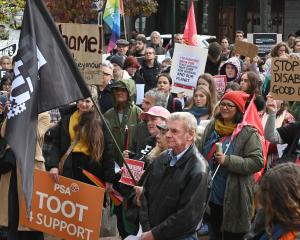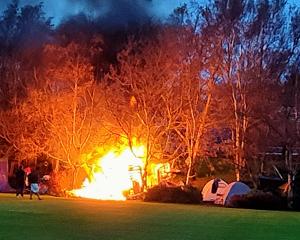Enhancing the abilities of drivers and improving attitudes towards driving will reduce the number of fatal and serious-injury crashes on our roads, police say.
In the past five years there had been a combined total of 432 fatalities and serious injuries resulting from 372 crashes in Dunedin.
Dunedin Southern District serious crash unit crash analyst investigator Constable Mark Rodgers said crash figures would improve if people were more ''positive'' about sharing the road.
''A lot of it is down to attitudes towards other road users and the attitudes towards their own realistic driving skills.
''Pedestrians also have a degree of responsibility just as much as any other road user does. There are risks for everyone that uses the road,'' he said.
Const Rodgers, who has been a police officer for 19 years, said he had never come across a crash where the vehicle or environment had been the single causative factor.
''They can be a contributing factor but a lot of it comes down to the driver. If you don't drive to the conditions you put yourself and other road users at risk. When you add drug use, alcohol and fatigue it is a lethal combination that we quite often see in a fatal or serious-injury crash,'' he said.
The aim of the serious crash unit is to find the causative factors and establish who is at fault in a serious injury or fatal crash. Often it results in police giving evidence at a District Court, High Court or coroner's hearing. Const Rodgers is one of three analysts who cover the Southern Police District, investigating all serious injury and fatal crashes.
A range of equipment, including forensic mapping, an accelerometer and other mechanical tools are used to investigate such crash scenes.
''We have different measuring tools and mechanical tools to accurately measure crash scenes and take vehicles apart. We use an accelerometer. It measures the friction value of the road surface and can measure acceleration and deceleration.
''If it is wet, spray paint often won't work [to mark the scene]. A nail gun can mark areas of interest at a scene,'' he said.
Investigations can take several months but ensuring all evidence was identified, preserved and accurately recorded before a road was reopened took priority, Const Rodgers said.
''We only get the one chance to get it right. I will not open the road at the expense of losing essential and sometimes vital evidence. We have to make sure the road is clear and safe to open. It might take three hours or eight, depending on the location and complexity of the scene,'' he said.
Dealing with victims' families is one of the most difficult parts of Const Rodgers job.
''It's a part of the job that can be quite difficult to do. We can't always establish what is going on in their [the driver's] head at the time [of the crash] but we can give an indication of the pattern of behaviour prior to the incident.
''People talk about closure. In an incident where someone loses a loved one, they never get full closure. It doesn't matter how much counselling they have they will never get full closure. It will help and bring them a step closer but it's always going to be with them for the rest of their lives,'' he said.












